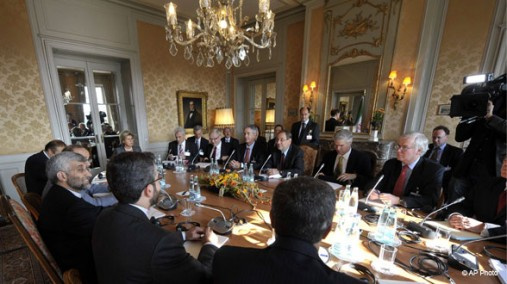Unfavorable Conditions Force the West to Negotiate With Iran

Sheikh al-Islam, while stating that there are only two resulting possibilities in the Baghdad talks, went on to say, “ The P5+1’s acceptance of Iran's right to enrichment was either a tactical plan or they changed their policy as soon as they realized that pressure had not worked and Iran would continue on its way.”
The international affairs expert added, “If the West is hopeful about the effectiveness of sanctions against Iran, their approach in the Istanbul talks, and consequently in Baghdad, must be tactical. We must therefore wait and see to what extent the West’s approach is tactical and how much of it is based on their policies.”
He emphasized that the positions of the P5 +1 regarding Iran have changed and said, “This is the weak point of the West and the strong point of the Islamic Republic of Iran in negotiations.”
Regarding the question of why the West needs to negotiate with Iran, Sheikh al-Islam stated, “They are in unfavorable domestic and regional circumstances and, meanwhile, they observe Iran’s progress as well, so they have understood that not negotiating is of no use to them.”
The international affairs expert emphasized that the strategy of sanctions and negotiations has not been fruitful for the West, and that they now want to change their policy. He added, “The Iranian negotiating team must pay attention to the extent to which the West’s approach is tactical and publicity-based.”
While stating that the West knows that Iran does not seek a nuclear bomb, Sheikh al-Islam said, “According to the fatwa of Ayatollah Khamenei and based on our Islamic beliefs, it is clear to the West that this position of the Islamic Republic is quite serious.”
Sheikh al-Islam pointed to the Iranian nation's resistance as the Islamic Republic’s winning card in the Baghdad talks, and said, “After the first round of Istanbul talks (in 2010), there were no negotiations for 15 months and during this period, certain changes occurred in our favor.”
He then went on to talk about Iran’s domestic situation and said, “Iranian parliamentary elections on March 2nd and the demonstrations in the 22nd of Bahman celebrations, which were a show of support for the Islamic Republic, were considered a winning card for Iran in the second Istanbul talks.”
Sheikh al-Islam further commented, “Even regional equations have played out in Iran’s favor; the fall of Mubarak and the US’ failure in changing the Assad regime can be assessed in this context.”
While referring to Iran’s technical superiority in the nuclear debate, Sheikh al-Islam added, “After the first round of Istanbul talks, we continued the construction of third-generation centrifuges and activated the Fordow site, and even increased the amount of enrichment to 20 percent.”
The international expert stated that Brazil, Russia and China have supported our positions and added, “The West has its own social and economic problems and looks to influence its own elections through these negotiations.”
While stating that another important point is Israel’s insanity in threatening to attack Iran and Iran’s strong response, Sheikh al-Islam said, “Therefore, all of the issues have led to conditions that are in our favor, and Iran’s strength in the second round of Istanbul talks was better than ever.”

